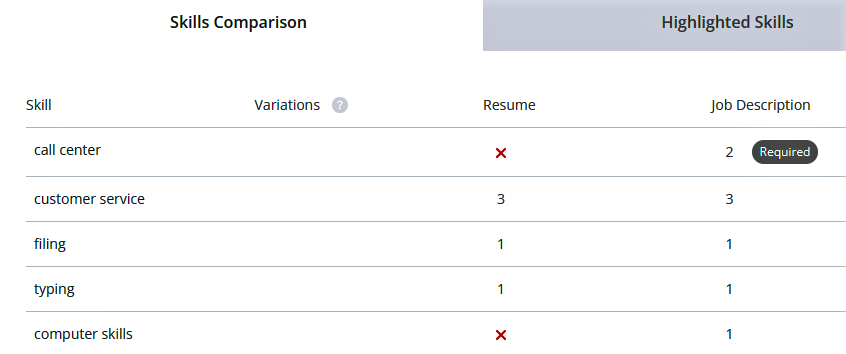In the world of resume analysis tools for universities, VMock and Jobscan stand out as the top players.
Both systems use artificial intelligence (AI) to analyze students’ resumes. Both provide students with a resume score along with tips to help them improve their scores.
But there are some significant differences. Let’s take a look at VMock first:
VMock is great for the basics
VMock is great at covering the basics of resume optimization. Its SMART resume feature analyzes resumes against 100+ criteria to make sure users are adhering to best practices.
These criteria include:
- Word choice and grammar.
- Evaluation of the skills and competencies listed on the resume.
- The layout, formatting, and visual appeal of the resume.
- Feedback on each bullet point, ensuring clarity and impact.
VMock has other features that can help students, including:
CareerFit – Students can access a “Fit Score”. This tells them how well their skills and qualifications match specific career pathways.
Aspire – Students can optimize their LinkedIn profile so it attracts a higher number of views from potential employers.
SMART Wall – This is a curated list of job opportunities tailored to students’ skills and experience.
SMART Pitch – This tool helps students prepare for job interviews by providing them with a score based on their answers.
All these features are a great starting point for job seekers writing a resume for the first time. Unfortunately, simply following resume standards isn’t enough to land a job interview anymore.
Why? Because of applicant tracking systems, or ATS.
VMock doesn’t account for ATS
Most companies today rely on applicant tracking systems (ATS) to help them with the hiring process. This includes over 97 percent of Fortune 500 companies.

The key thing to understand about ATS is that it enables employers to filter and search for resumes based on keywords.
While VMock recommends keywords relevant to general job titles, it doesn’t hone in on keywords tailored to a specific job position.
Why is this important? Because unless a student tailors their resume to a specific job, it risks falling through the cracks.
In fact, 88 percent of employers claim their ATS dismissed qualified candidates because they didn’t precisely match the job description criteria.
“Get over the generalist’s point of view,” a veteran Silicon Valley recruiter told Jobscan. “This is a time where specifics matter. There’s specific talent being requested. Pay attention and respond to that.”
Jobscan tailors resumes to specific jobs
Many university career coaches say they can’t convince students to tailor their resumes. Why? Because it’s too time-consuming and difficult.
Enter Jobscan. With its intuitive interface and advanced algorithms, Jobscan allows students to quickly and effortlessly match their resumes to specific job descriptions.
It works like this:
- Students upload their resume and the description of the job they’re applying for into Jobscan’s resume scanner.
- The scanner then analyzes the student’s resume against the job description.
- Students are then provided with a resume score based on how well their resume matches the job description.
- Students are also told which skills, or keywords, they should add to their resume to increase their score. The higher the score the better the chance of getting an interview.
Let’s say a student is applying for a customer service job. They paste their resume and the job description into Jobscan and click “scan”.
They’ll immediately receive a report telling them how to optimize their resume for that specific job. Here’s an example of a report:

As you can see, the keyword “call center” is required for this customer service job. The student must have this particular keyword on their resume to have a realistic shot at getting an interview.
VMock doesn’t tell the student this crucial piece of information. Jobscan does.
Perhaps the best way to describe the main difference between VMock and Jobscan is this:
VMOCK allows students to create one great resume to send out with every application.
JOBSCAN allows students to create many great resumes, each one tailored to a specific job.
In today’s job market, Jobscan’s targeted approach is far more effective. In fact, our research shows that students using Jobscan can increase their chances of getting an interview by 50%.
Jobscan provides expert feedback
Like VMock, Jobscan analyzes resumes against a set of established criteria for best practices.
However, what sets Jobscan apart is its deep understanding of the evolving recruitment landscape.
By continuously updating its algorithms with feedback from industry experts, Jobscan ensures that students receive the most current and relevant advice.
Here’s an example of Jobscan’s “Recruiter’s Tips” section:

Jobscan’s full suite of job search tools
Jobscan doesn’t just optimize resumes. It offers a comprehensive suite of tools that address all aspects of the job search process.
Jobscan’s suite of tools include:
- LinkedIn Optimization – Students optimizing their LinkedIn profile with this tool can increase their number of views by 132 percent.
- Cover Letter Generator – Students can use GPT-4 technology to create a personalized and ATS-friendly cover letter in one click.
- Cover Letter Scanner – Students can analyze their cover letters against the job listing to identify the skills and qualifications they should highlight.
- Job Tracker – Students can track and manage all their job applications and interviews in one place.
- Job Matcher – Students can access a curated list of job listings from Indeed based on the top skills and keywords found in their resume.
Jobscan allows unlimited uploads
VMock offers students just 10 resume uploads per year. This suggests there is a finite amount that students can learn from their service.
In contrast, Jobscan allows students unlimited resume uploads. Each time, they learn more about recruiter insights and customized keyword optimization techniques.
Final thoughts on VMock vs. Jobscan
VMock’s strength lies in its simplicity and immediate feedback, making it ideal for those new to resume writing.
In contrast, Jobscan provides a comprehensive analysis, ensuring that students’ resumes are not only well-written but also ATS-friendly.
When it comes to tailoring a resume to a specific job, Jobscan delivers more in-depth insights than VMock.
Ultimately, Jobscan helps students create resumes that will get them more job interviews.
Bring Jobscan to your school
Interested in Jobscan for your university career center? Check out our Higher Education solutions page.
More expert insights on this topic:


















